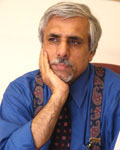Editors Note: Ethnic Minorities Shut Out of Municipal Government
 Hassan
Zerehi news@shahrvand.com
Hassan
Zerehi news@shahrvand.com
Toronto
is the city of minorities, the city of ethnicities, rituals, traditions,
and various beliefs. In a city of almost three million, more than 40% of
the population is from various ethnic communities, yet the voices of these
large constituencies remain unheard in the municipal, provincial or
federal governments of this country. There are many reasons for this
reality. The main reason being, the invisible red line placed before
immigrants, which marginalizes our communities. Those of us who are able
to transgress these barriers are faced with much difficulty. Voters from
ethnic communities make up a very small segment of the total voting
population. As such, those who regularly participate in elections do not
look sympathetically upon ethnic candidates. In addition to this fact,
after September 11 and the unforgettable tragedy of that day, the
situation has taken a turn for the worst.
The solution for this societal problem, which robs us of a voice and
presence in our host country, is primarily in our own hands. If we want to
be seen, if we want to be heard, if we want to have presence and
influence, it is best to refrain from our long standing practice of
inaction and fence sitting. It is in our benefit to have ongoing
involvement in social, political, and economic matters. If we confront
daily issues with a lack of responsibility and care, the outcome, if not
worse, will remain the same lack of presence in today’s political and
social arena.
However, in addition to our community, the Municipal, Provincial and
Federal governments as well as the broader Canadian population also have a
responsibility; they must also pay attention to the issues that effect the
entire population of this country rather than merely select
constituencies. When examining the Federal Government’s over $100
million budget for advertising and how not even $1 million of that money
reaches the ethnic press, one can see the large discrepancy between
resources allocated to our communities and those allocated to other
Canadians. While neither, the various languages, traditions, religions, or
nationalities of this city or country are economically, politically, or
socially attended to or acknowledged; one cannot expect these large but
silent minorities to play a role in the broader theatre of Canadian
society.
Looking at the list of successful candidates in the recent municipal
election across the GTA and its surrounding cities, I realized that as a
general rule those who were successful at obtaining City Council and
School Board Trustee positions are not from ethnic communities. The
question is this, how is it possible for almost half of the population of
the city to remain without a voice? Whose fault is this lack of
representation? Is it only our sense of political anxiety for being
ignored and the resulting paralysis? Or are the necessary tools for
participation, action and involvement lacking for our populations? The
wealth generated by ethnic minorities through our work, investments,
business ventures and tax dollars are rarely used in the political or
social interest of our communities. Once again, I return to the example of
the $100 million budget where only $1 million was allocated to ethnic
minorities as the general practice when it comes to resource allocation in
Canada.
When our communities do not have a meeting place or community centre, when
our people do not have the time, opportunity or luxury to gather, how can
we be able to participate effectively in political, social and economic
decisions that affect our life and well being? When and how will we be
able to, aside from the daily grind, attend to other matters?
Many of the candidates from the various ethnic communities, after months
of running around, are now forced to gather their campaign material along
with their hopes and dreams from the sides of streets, roads and
intersections; hopeless and tired they once again return to their homes.
These defeats are in many ways detrimental to our communities, many of us
look at these painful lessons and equate civic participation with defeat
and in turn become increasingly hesitant to face the same music in future
elections. Unfortunately, as our communities are turned away from civic
duty, there is no one who asks where is the share of these large
populations in the Federal, Provincial and Municipal decision making
bodies?